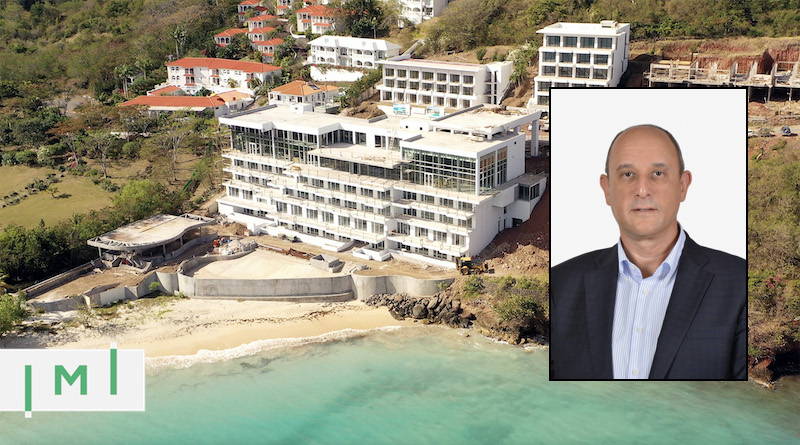Warren Newfield Responds to PM Mitchell’s Claims in Exclusive Interview With IMI
In an IMI exclusive, Warren Newfield, who recently resigned from his post as Ambassador-At-Large and Grenadian General Consul in Florida, offers details on his version of the events that culminated in his stepping down and his reaction to government statements. Those initial statements left many questions unanswered and IMI has, therefore, raised further questions with both parties to the discussion. This is the first time Newfield has addressed the press since his resignation.
Important disclosures: IMI wishes to disclose that Kimpton Kawana Bay (KKB) has, on past occasions, been an advertiser on this platform, as have other Grenada-based CBI developers. IMI has also invited Mr. Warren’s counterpart, Grenada’s government, to elaborate on its version of events, which we will publish if and when we receive a response. If any reader feels we have given any party to this discussion preferential or unfair treatment, we encourage you to contact the editor on cn@imidaily.com.
You can skip directly to a particular response by clicking the linked questions below:
Mr. Newfield, there has been a lot of talk about your resignation, especially your statement that the current government has created an “anti-business” climate within Grenada. The government has stated through a press release that there were no recent changes in business operation or investment laws, so how did the climate within Grenada become anti-business in your opinion?
The government has steadily and substantially been throwing up roadblocks to business development in key sectors and in particular the CBI industry. The opinion is not mine alone. One need only consider where Grenada falls in the World Bank’s most recent global rankings for “ease of doing business” in countries worldwide. In the 2020 edition, Grenada fell squarely into the bottom percentile—146th out of 190 countries ranked globally. That was the fourth lowest showing in the Americas, behind impoverished and hobbled nations like Venezuela, Haiti, and Surinam.
A specific example can be found in the recent ruling against Grenada by the World Bank’s arbitration arm, ICSID, in its dispute with the country’s electric utility GRENLEC. In awarding more than US$67 million, the Tribunal found that Grenada failed to comply with the terms of its long-standing investment agreement and made groundless charges of “willful malfeasance” as a defense. As someone officially charged to attract foreign investment and development into the country, and as someone involved in my own development project on the island, I witnessed this deterioration of conditions first-hand with arbitrary reversals of government commitments to the Kimpton Kawana Bay project.
In your resignation letter you appealed for change and a more level playing field, do you think your resignation can be a catalyst for actual change? What changes do you want to see?
My resignation was undertaken as a matter of conscience as well as practical necessity—I felt I could no longer faithfully represent the country as an ambassador and consul general in light of what I have perceived is a government posture markedly unwelcome to foreign investment. I would have felt a hypocrite had I continued to hold those roles.
Had I remained a diplomat, I would be restrained from taking the necessary steps to protect those CBI purchasers who have invested in Kawana Bay along with those who invest alongside me. As my letter stated, ‘I wish nothing more than a level and rational playing field for those who wish to do business, create jobs and grow the economy to ensure a bright future” for Grenada. If my action spurs others to step forward and add their voices for reform, then, absolutely, my own resignation can help bring about positive change for Grenada, which desperately needs help in moving forward.
The government’s statement said your “anti-business” claim was induced by an investigation into the Kimpton Kawana Bay project, and that an independent auditor has been approached to investigate the matter. Is there an ongoing investigation? Would you like to shed some more light on the status of the project?
Our independent auditors recently provided the government with confirmation that all CBI funds that Kawana Bay has collected have been used to develop the project and no developer fees have been paid out. The government’s insinuation that CBI funds have been misused is false. We have submitted quarterly reports detailing all expenditures for four years that have never been disputed by CBI, and we have always cooperated fully with government inquiries.
Kawana Bay has by far been the most successful CBI project since its development launch in 2017. Approximately 92% of available units at the property have been sold or committed for sale by international investors – despite the restrictions governing on-site visits during the pandemic over the past 15 months. That is striking testimony to how far we have come in upholding our side of the project.
In response to the government’s statement that your resignation was based on the ongoing investigation into your project, and not by the economic landscape in Grenada, do you believe there are other investors who share your sentiment?
As noted, my resignation is the culmination of a steady disregard by the government for the rule of law and an increasing lack of support for private enterprise. Believe me, if I thought what was happening was along the lines of minor speed bumps that are a normal part of doing business in a developing Caribbean economy, I would have happily worked to see them through. For me to resign my posts as ambassador-at-large and Consul General reveals how off the rails the government has gone in its approach to foreign business ventures.
In October 2020, the Prime Minister, Dr. Keith Mitchell said about Kawana Bay: “I must commend the project developers and investors for creating this idea and executing it.… We expect Grenada’s tourism product to be revived in the not-too-distant future and developments like these help to expand and improve our offering.” We are determined to ensure that the government fulfills its commitment to the CBI purchasers and to the project, which has the promise of jobs and other economic benefits for the country.
Prime Minister Mitchell said your resignation was a preemptive move and that you would have been stripped of your diplomatic status. Did you receive any notification of the kind?
I heard nothing from any government representative regarding any planned change to my diplomatic position. I assure you my resignation was motivated by my own strong sense of honor and personal integrity and not as a tactical move to quit before I was fired. There was nothing preemptive about it, other than my need to be in a position to take the necessary steps to protect the interests of CBI purchasers and my investors, which I could not do while serving as a diplomat.
You highlighted the government’s influence on Grenlec and its attempt to expropriate the Rex Hotel as signs of what you describe as an anti-business climate in Grenada, do you think CBI projects will undergo greater government influence or even direct management in the near future?
I believe that government oversight of CBI projects is important. That said, fair governance demands that regulations and oversight be applied consistently and without arbitrary changes, and administered by individuals who are independent, suitably qualified, and have the necessary skill set to understand the complexities of developing large hospitality projects. I am sure readers are well aware of the recent resignations of both the CEO and Chairman of the CBI unit, which provides evidence of the instability within the CBI program.
The opening of the hotel has been delayed on a few occasions in the past. Why have you needed to put off completing the project?
Unfortunately, as is often the case with large-scale construction, unforeseen events affected the planned pace of construction. Whether design changes and upgrades in keeping with our international brand standards, import/shipping issues, or delays in the processing of the required final planning approval needed to start construction works on various phases, several unavoidable issues have contributed to the postponement of the expected completion date. Most recently, the direct and indirect impact of the Covid-19 pandemic has presented a serious challenge to the construction sector.
This led to further delays as a result of the temporary closure of our construction site and other factors outside of the developer’s control such as interruptions to supply chains, shipping delays, and mandatory reduction of labour force to comply with physical distancing requirements. We took very proactive steps to mitigate the delays caused by the pandemic, and after the end of the lockdown in Grenada, we were able to quickly recommence construction activities, albeit at reduced capacity. Our focus has always been on making every effort to see Kimpton Kawana Bay through to completion of construction and into operations as quickly as commercially practicable, always bearing in mind the interests of each one of our purchasers. Importantly, we have always kept our purchasers updated on the progress of the project.
In November last year, you announced that 312 sales were either in progress or complete and that the project was 74% sold. Today, you’ve indicated 92% of available units have been sold or have been committed for sale. Would such high sales rates not have raised the necessary capital to finish the project already, as the government asserts?
The numbers quoted are correct, but the parameters should be clarified. Sales in progress or completed include (i) purchasers who have already been approved for citizenship through CBI, (ii) purchasers who have submitted CBI applications and have not yet been approved, (iii) purchasers who have signed purchase agreements but have not yet submitted applications and (iv) purchasers who have reserved a unit for purchase pending signature of purchase agreements and are in the starting to gather documents for application submission. All these factors considered and yes, we are at 92% commitment on Kawana Bay inventory. That is truly an impressive commitment level in view of the unprecedented challenges of the past 15 months.
However, the only funds raised to date have come from those purchasers who have already been approved for citizenship and have paid the investment amount. As the government can certainly confirm from its records, those purchaser funds do not cover the project budgeted costs as approved by the government in 2017 and reaffirmed in 2020.
Keith Mitchell has indicated you wanted to raise a further $40 million in CBI funds. Is this correct?
Yes, there remains approximately $40 Million to be raised based on the approved project budget. To date, the project developer has only received funds equal to approximately 59% of the approved project budget. If the government approves the purchaser commitments (as described above), the project would be approaching full funding. Based upon project sales, funding should not be an impediment to completing the project.
It should be noted that as construction of the fourth and final building accelerates and the outfitting of all buildings get underway, the Kimpton Kawana Bay Project will employ approximately 200 workers. Once open, the hotel is expected to provide 300 direct jobs and the spin-off factor will provide for another 800 indirect jobs. This at a time when Grenada’s unemployment rate remained in excess of 15%, prior to the effects of the Covid-19 pandemic taken into account.
Ahmad Abbas is Director of Content Services at Investment Migration Insider and an 8-year veteran of the investment migration industry.



